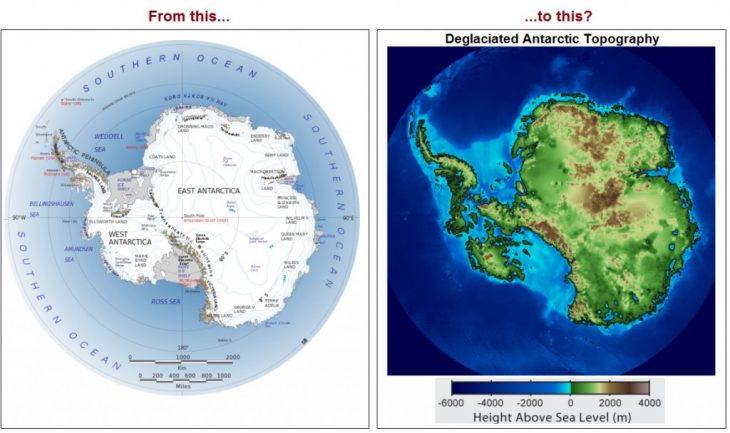Master in City & Technology 2019/20 – Term I
Workshop Name: Data & Maps, Concepts & Prospecting Strategies
Total Hours: 20 hours
Faculty: Manuel Gausa & Nicola V. Canessa

Credits: Left – Major geographical features of Antarctica today (Source: Wikimedia Commons (NASA/BAS)). Right – A topographic map of Antarctica after removing the ice sheet, accounting for isostatic rebound and sea level rise (Source: Global Warming Art Project).
If we understand the new logics –associated to a new Advanced Urbanism– in relation with the challenges of a new informational era –and the capacity, in this one, to multiply the interactions between conditions and information(s)– we need to understand in what terms we define “information”, not only as a data-parameter or a data-indicator but as a more enlarge concept associated to other assimilated key-terms (programs, solicitations, messages, patterns, identities, matters, cultures, types, behaviours, senses, networks, natures, morphologies and metabolic contexts) able to be combined in (and through) new –and more– open strategic urban approaches.
The workshop “Data & Maps, Concepts & Prospecting Strategies” wants to aid the students to work with strategic concepts able to synthesize conditions, solicitations, situations and information through elemental (evolutionary and open) criteria-diagrams, able to conduct complex developments.
- The workshop “Data, Maps, Concepts and Prospection Strategies” wants to insist on the relational aspects of advanced urban perspective related to the synthetic integration between complex systems and their vectorized orientation (from strategic concepts, compressors, and transfers at the same time).
- The idea of ??the Battle Map associated with the idea of ??the Field of Forces will be essential in a theoretical-practical workshop. During the previous work of the students about the Antartida Protocols, some advances in the program will be made to allow students to recognize and project at the same time. Within the previous mapping sectoral analyses, some strategic locations have been chosen.
- In this speed-program, each group of students will perform a selection and compression exercise at time, selecting layers of informational structures with latent capacities that can be improved from their empowerment and individual reinforcement (connectivity, circuits, use, activity, program, production, flow, etc.)
- – Compressing these layers – structural and informational – into a single strategic concept that integrates and reinforces them in synergy, with evolutionary and adaptive capacity.
Faculty

Manuel Gausa, architect and full professor of Urban Design and Urban Planning since 2017 at the Department of Architecture and Design, University of Genoa (UniGe). Coordinator of the ADD, PhD in Architecture and Design at the Department of Architecture and Design (DAD-UNIGE – University of Genoa) directs the GIC Lab, Research laboratory in architecture, urbanism and landscape. Cofounder of IAAC, Institut d’Arquitectura Avancada de Catalunya.

Nicola V. Canessa, architect and adjunct Professor in urbanism university program at Department DAD, University of Genoa (Italy). PhD in Architecture at ADD Genova, Doctoral School of Architecture and Design at the University of Genoa, since April 2012. The theme of the thesis is “The Mediterranean City”, analysis of the changes taking place on the Mediterranean coasts and the factors that affect the intercontinental inhabit the coastal territory.
